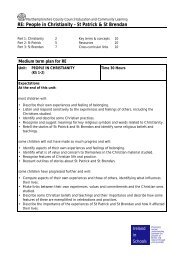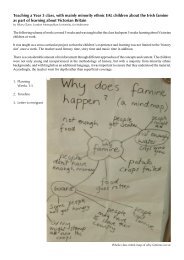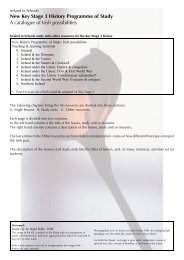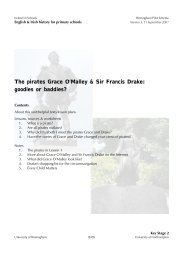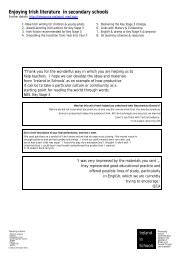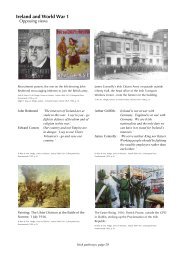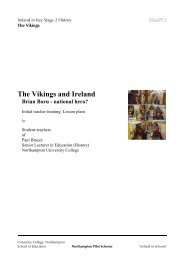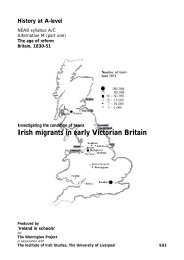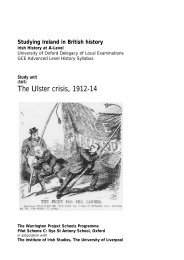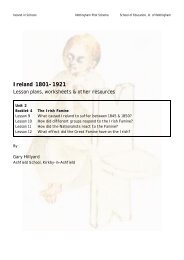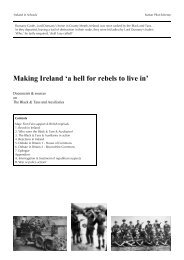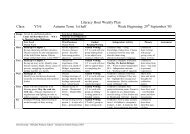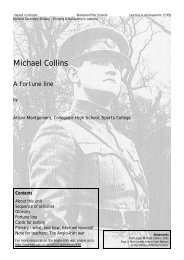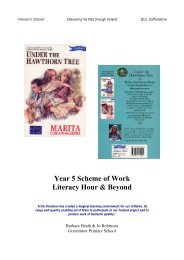E:\Irish music\A4 Irish history in song 1 & 2.wpd - Ireland in Schools
E:\Irish music\A4 Irish history in song 1 & 2.wpd - Ireland in Schools
E:\Irish music\A4 Irish history in song 1 & 2.wpd - Ireland in Schools
Create successful ePaper yourself
Turn your PDF publications into a flip-book with our unique Google optimized e-Paper software.
A modern polemic? Young Ned of the Hill by the PoguesBased on ‘Young Ned of the Hill and the Reemergence of the <strong>Irish</strong> Rapparee: A Textual and Intertextual Analysis’Ray Cashman, University of Indiana, U.S.A., Cultural Analysis Volume 1, 2000http://ist-socrates.berkeley.edu/~caforum/colume1/vol1_article4.html1. SummaryIn 1989, the Pogues, an eclectic <strong>Irish</strong> folk/punk/rock band, <strong>in</strong>cluded ‘Young Ned of the Hill’, a <strong>song</strong>written by Ron Kavana and Pogues member Terry Woods, on their ironically titled album, Peace and Love.The <strong>song</strong> is somewhat remarkable as a political statement, fiercely condemn<strong>in</strong>g Oliver Cromwell and hisruthless seventeenth-century campaign through <strong>Ireland</strong>.It is really about the conflict <strong>in</strong> Northern <strong>Ireland</strong>. It selectively draws upon and re-<strong>in</strong>terprets the folk-loreof Ned of the Hill and <strong>Irish</strong> musical traditions to lend support and legitimacy to the IRA.Given the <strong>song</strong>’s juxtaposition of Ned and Cromwell - resistance fighter and English <strong>in</strong>vader - the <strong>song</strong>provides commentary on the role of republican paramilitary groups such as the <strong>Irish</strong> Republican Army (IRA)<strong>in</strong> contemporary Northern <strong>Ireland</strong>, a commentary that draws on the aura of tradition for its authority.As an allegory for contemporary political conflict <strong>in</strong> Northern <strong>Ireland</strong>, ‘Young Ned of the Hill’ is an attemptto provide that assignment of virtue and blame and to render the world <strong>in</strong> black and white. If the IRAvolunteer can be equated with the rapparee of folklore, he, too, partakes of the transgressive power and appealof one who can simultaneously be bad and do the right th<strong>in</strong>g by break<strong>in</strong>g the law. He, too, is a heroic outlawenforc<strong>in</strong>g social justice and <strong>in</strong>vok<strong>in</strong>g laws higher than those legislated at the expense of the oppressed.The <strong>song</strong>’s tone ‘is also standard fare for this now defunct London-based band of mostly <strong>Irish</strong> ex-patriots,who cultivated an image of hard-dr<strong>in</strong>k<strong>in</strong>g, blue-collar machismo.’2. The textIn this <strong>song</strong> Ned’s function is to provide a platform for the denunciation of Cromwell and the ills hevisited on <strong>Ireland</strong> and the <strong>Irish</strong> and to create an ‘us’ and ‘them’ conflict between the <strong>Irish</strong> and the English.There are four stanzas and a refra<strong>in</strong> that appears after the first two stanzas and last two stanzas. The firsttwo stanzas, each of seven l<strong>in</strong>es, can be taken as a unit, as can the last two, each of eight l<strong>in</strong>es.The first stanza establishes the bleak and lonesome existence of the rapparee <strong>in</strong> ‘lonesome hill’ , while thesecond populates the hills with noble men, the victims of Cromwell, will<strong>in</strong>g to fight with Gaelic honourheld up high. Then comes the vilification of Cromwell <strong>in</strong> the refra<strong>in</strong> (‘A curse upon you OliverCromwell/You raped our motherland’) and fourth stanza.Ned is mentioned by name only twice, briefly, and not until the second to last stanza. In fact, only oneof the four stanzas, the third, is entirely devoted to him, whereas Cromwell is <strong>in</strong>troduced <strong>in</strong> the secondstanza and rema<strong>in</strong>s the narrator’s addressee <strong>in</strong> the refra<strong>in</strong>s and possibly <strong>in</strong> the fourth stanza. The lyricsprovide meagre <strong>in</strong>formation about Ned, although they establish that Ned was prompted to become arapparee as a result of his family be<strong>in</strong>g dispossessed and slaughtered. Consequently, the English put aprice upon his head for which he was murdered.The use of an authoritative narrator (‘I’ - possibly one of Ned’s fellow resistance fighters and thus agallant man) creates ‘us’ (l<strong>in</strong>es 8, 9, 10) and ‘them’ groups: Cromwell’s victims described as noble andbrave <strong>in</strong> their resistance, on the one hand, and oppressors - Cromwell and the English on the other. Thesegroups are <strong>in</strong> timeless opposition for the narrator <strong>in</strong>dicates that ‘S<strong>in</strong>ce Cromwell pushed us westward’(l<strong>in</strong>e 8) - from the mid-seventeenth century onwards <strong>in</strong>def<strong>in</strong>itely - everyone who resists Englishcolonization is effectively part of the same solidarity.The use of ‘you’ changes from signify<strong>in</strong>g the imag<strong>in</strong>ed listener <strong>in</strong> the l<strong>in</strong>e 1 to Cromwell <strong>in</strong> the refra<strong>in</strong>(l<strong>in</strong>es 15-18, 20-1, 38-41, 43-4) and probably <strong>in</strong> stanza four (l<strong>in</strong>es 30, 32-3). The change signals a shift<strong>in</strong> attention to the antagonist <strong>in</strong> the story of Ned’s life. Not only is Cromwell addressed, <strong>in</strong> the thirdstanza he is cursed with ‘A curse upon you . . . and may you burn <strong>in</strong> Hell tonight’. The narrator’s curseIiS, <strong>Irish</strong> <strong>history</strong> <strong>in</strong> <strong>song</strong> 1 & 2, page 22



